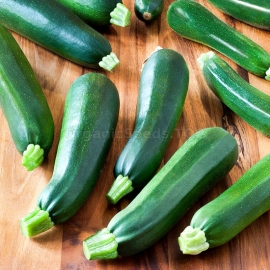




«Black Beauty» - Organic Squash Seeds
1.14 €
The standard summer squash, introduced in the 1920s. Large bush plants grow semi-upright and open, and are loaded with glossy dark green fruits with firm creamy white flesh and fine flavour. Plants are productive very early, and over a long period.
-
Heirloom Zucchini «Black Beauty»
The standard summer squash, introduced in the 1920s. Large bush plants grow semi-upright and open, and are loaded with glossy dark green fruits with firm creamy white flesh and fine flavour.
Plants are productive very early, and over a long period. Best eaten when under 20cm (8″ long). Black Beauty zucchini seeds are the best variety for freezing. Black Beauty zucchini is a 20th Century HEIRLOOM that won the All American Selections prize back in 1957. It was first introduced to American market growers in the 1920s, and was commercially available as seed from the 1930s on.
How to grow
Squash need plenty of sun and good drainage, and they love wrapping their roots around bits of decomposing leaves or other compost. Prepare the ground for squash by mixing in a 3-inch layer of compost along with a timed-release or organic fertilizer at the rate recommended on the label. Squash are usually big plants, so space plants at least 3 to 6 feet apart (follow directions on the stick tag).
A light mulch is sufficient because squash leaves are so broad and dense that mature plants minimize weeds and provide cooling shade. When setting out squash seedlings in sunny weather, you may cover them with an upside-down flowerpot or other shade cover for a couple of days after transplanting to help prevent wilting.
Squash bears both male and female flowers. The female flowers are easy to identify by looking for a tiny squash below the blossoms. Male flowers, which often begin to show up a week or two before the female flowers, sit directly on the stem.
To help female flowers develop into squash, bees and other small insects pay numerous visits, leaving behind trails of pollen brought from male blossoms. Male flowers often drop to the ground at the end of their life; don’t be alarmed, as this is normal.
